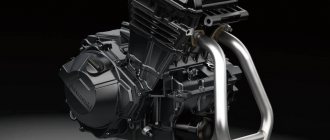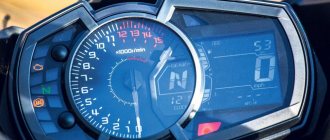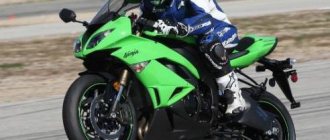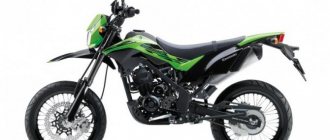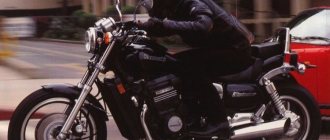Kawasaki KLR650 2022
Great news for dual sport fans: the Kawasaki KLR650 is back. Since its introduction in 1987, the cubic all-terrain motorcycle has become one of the most popular and sought-after Kawasaki models - and now the KLR650 goes on sale again in the 2021 calendar year as a 2022 model (I agree, it sounds strange, but this is not the first time this has happened and not only with Kawasaki).
Appearance
According to reviews of many English-speaking Kawasaki connoisseurs, the KLR 650 looks in military style. However, this impression probably came from the characteristic dark green coloration. In other colors the bike does not create such an impression.
Although it is worth noting that its shape looks brutal and makes the car look reliable. This effect is achieved by angular shapes and large mirrors of regular shape.
Of course, the wheels here are spoked, this is enduro. The windshield looks very stylish, but is not high. Therefore, the wind can be felt on the helmet.
However, taking into account the fact that the bike, in principle, is not conceptually designed for fast riding, this can hardly be considered a disadvantage. It is possible to change the windshield.
Useful little things
Regarding the ergonomics of the Kawasaki KLR650, it is worth noting the rubber spacers on the handlebars and footrests, which reduce vibrations from the single-cylinder engine. The handlebars and footpegs have been spread 10mm to increase comfort. The new fuel tank has a convenient shape for a natural grip with the knees, and although its volume remains the same - 23 liters - the new fuel pump allows for more efficient use of remaining fuel, thereby increasing the range.
The seat has also changed - both the shape and the upholstery. Even the thickness and density of the filler have changed, making the fit more comfortable. Rubber spacers are located under the seat, isolating vibrations even better. The passenger handles have a new shape, and the side stand is 30mm shorter, making it easier to use.
Comfort
With production ending in 2022, parts are not hard to come by, making maintenance easy. The car is comfortable to sit in, despite its large dimensions. Large and round mirrors make it easy to observe the situation from behind. As for the seat, it is perhaps one of the most comfortable among enduro bikes.
The car is good off-road, although, of course, it cannot be compared with a motocross motorcycle. The latter is lighter and more agile. But in some sections of the route, enduro, thanks to its weight and power, can go better. So a lot depends on what kind of rough terrain we are talking about.
Peculiarities
Front view.
Back view.
Dashboard.
Rear shock absorber.
- Good traction at any speed.
- There is also good elasticity , when in the same gear you can sharply tear away from a traffic light, “vomit” in traffic jams, or smoothly accelerate to overtake a crawling truck in front.
Dimensions and weight
The dimensions are impressive. Some might think this is a touring enduro by looking at it like this. However, given the technical characteristics, such weight and dimensions are appropriate. The result is a passable bike for tourism and sports on rough terrain.
The dimensions are:
- height – 1350 mm;
- width – 960 mm;
- length – 2295 mm;
- wheelbase – 1480 mm;
- seat height – 890 mm;
- ground clearance - 210 mm;
- curb weight – 194 kg;
- Tank capacity – 22 l.
The fuel tank capacity is enough to travel, although this is not a touring enduro, but a regular one. Perhaps this is a plus. Large dimensions make this Kawasaki motorcycle stable on the road. This is especially important in the steppes where the winds are strong.
Review of the Kawasaki KLR 650 motorcycle (KL650-A, KL650-B, KL650-C, KL650-E)
To be honest, this motorcycle is not the ultimate dream. It seems like enduro, but some of the “branded” features are surprising. Why couldn’t the chain tensioner be made like on Honda’s XRs? Why make a choke lever in a place so incomprehensible to me (under the left handlebar), as a result of which I dropped the motor on my leg and broke it (lever :))? Why do you have to scatter almost all the plastic to unscrew the spark plug? The cooling fan fuse is a different matter. And the travel of the front soft fork is most often not enough for me to drive “drivingly” on the ground. These and other little things sometimes perplex not only me, but also experienced motorcyclists.
BUT! Upon closer examination, it turns out that everything is not so bad. And pleasant emotions and impressions are no longer comparable to the “cons” (in quotes because the cons are relative) of the design. Tensioner? And to hell with it. Tolerable. The suction will be improved over the winter. Either I’ll change its location, or I’ll replace it with some kind of iron one. Unscrew the spark plug - I will shorten the spark plug wrench by 2 times and then you will only need to unscrew the 4 bolts of the front side plastic when replacing (well, what can you do? The plastic will have to be removed anyway). Place the fan fuse in the plastic casing into a rubber fingertip and then you can “bathe” the motorcycle for a long time. I'll add thicker oil to the front fork - maybe it will get better.
He spoke about the disadvantages. About the pros:
The motorcycle is not expensive. At the time of purchase, there were about 4-5 offers in the region of 130-150 rubles.
At the time of purchase, there were about 4-5 offers in the region of 130-150 rubles.
650cc motorrrrr. Fuck these little checks. Boredom. Allows you to lift the front wheel while sitting, spinning the engine a little and releasing the clutch.
Fuck these little checks. Boredom. Allows you to lift the front wheel while sitting, spinning the engine a little and releasing the clutch. I haven't tried it on the go yet.
I haven't tried it on the go yet.
I went with my wife, I went with friends, I went alone - there’s quite enough power on the highway. But without wind protection it’s kind of scary. I will be using some kind of removable windshield for the collective farm next season. I took it to the forest, and put it on long distance.
Relative simplicity of design. In Zelenodolsk it refused to start. I rolled it into the yard, changed the spark plug, and drove on. Business for 15 minutes with conversations and stories with fellow travelers 
Easy. I don’t know how much it weighs, but according to PTS it’s 180 kg. I do not believe. Kilov 160. Plus I have a Supertrap exhaust. Looks easy. Sibikha had a lower center of gravity and, according to her passport, 186 kg - she climbed heavier.
It falls - well, okay. “Flying” in the forest, on the sand (at different speeds), once he decomposed on the asphalt - he doesn’t care. I picked it up, started it, and drove on.
There is no low end compared to the XR650L.
I think maybe this issue will be at least slightly corrected by a rear sprocket enlarged to 46 teeth. Again, regarding the suspension, where I was driving the XRL while sitting and basically didn’t care what kind of road there was under the wheels - I had to stand up on the KLR. And SuTener also taught me that it’s more efficient to drive a motorcycle while standing up off-road. In general, of course, although I would like to compare these two devices (it seems like they have the same cubic capacity :)), they are different motorcycles. It would be easier to say... the KLR is more asphalt... In my not big city, such a cubic capacity is amazing.
Sports, road workers 600k, liters in the city are not able to get away from me. They can't really speed up, but they drive calmly on broken roads. And as I scalded, I continue to scald. On the highway they are moving away from me anyway BUT! Not by much of a margin, to be honest. About trips to nature, to the forest...
Not by much of a margin, to be honest. About trips to nature, to the forest...
Here you need to understand that this motorcycle is not for specific shit. It's more of a walking tour. That's why I took it. But can I have a little fun in the forest? Please... Ride into the sand, onto the beach on horseback - if you can - please... even with a passenger. Can you climb a steep mountain? Do the tires allow you? Please... On a long trip - I loaded my luggage, sat down and drove off. In other words, a very versatile motorcycle. No, but it’s clear that he can’t compare with road workers on asphalt, and on sand with a cross-country bike, but he fulfills all my desires and requirements, be it even crossing a ravine or driving straight across a field.
It's more of a walking tour. That's why I took it. But can I have a little fun in the forest? Please... Ride into the sand, onto the beach on horseback - if you can - please... even with a passenger. Can you climb a steep mountain? Do the tires allow you? Please... On a long trip - I loaded my luggage, sat down and drove off. In other words, a very versatile motorcycle. No, but it’s clear that he can’t compare with road workers on asphalt, and on sand with a cross-country bike, but he fulfills all my desires and requirements, be it even crossing a ravine or driving straight across a field.
So... Why KLR, and not the XR650L, which I like so much? Because XRL costs from 230 thousand, and kava? I have already announced the prices. Despite its shortcomings and features, the KLR650 is a good device for the money and after half a season and about 4000 thousand mileage you don’t even want to change it. There is a desire to just modify it a little to suit yourself. Well, if I get rich, I’ll think about Honda 
I can say with full confidence about the KLR that it’s a crazy bike, especially for long-distance driving. Unpretentious, flying sofa. Which is constantly asked for; Well, let's go somewhere, let's go for a drive!!!! And you just have to give your consent, HE is already rushing you through the fields, meadows and passes. So there is no desire to look back, forward and only forward!!!!
The KLR650 is more suitable for long-distance driving, softer, I would even say much softer;-), heavier than the XR650L, it has good wind protection, a large tank of 24 liters with a consumption of +-6 liters (and this is a power reserve of almost 500 km...). It’s so easy to compare them, they’re a little similar, but different, ok. I changed the oil on the KLR650, hung up the panniers, filled them up, and headed to Mogocha... At gas stations I refueled every other time, loaded it with gear, it was possible not to take more than half, Vitek-Miner will confirm;-), and it’s all like a tank, there Ash won’t let you lie, From Khobara to Africa he’s in the morning, I’m on the KLR to Birobidzhan at 120-160 km/h, I didn’t even break a sweat ... Also, let me point out, he’s beautiful... he looks powerful, reliable, which is what he is...
It’s so easy to compare them, they’re a little similar, but different, ok. I changed the oil on the KLR650, hung up the panniers, filled them up, and headed to Mogocha... At gas stations I refueled every other time, loaded it with gear, it was possible not to take more than half, Vitek-Miner will confirm;-), and it’s all like a tank, there Ash won’t let you lie, From Khobara to Africa he’s in the morning, I’m on the KLR to Birobidzhan at 120-160 km/h, I didn’t even break a sweat ... Also, let me point out, he’s beautiful... he looks powerful, reliable, which is what he is...
I recently became the owner of such a miracle from the Kawasaki concern, 2010. First impressions are extremely positive. It has some nuances, as mentioned above, this is engine cooling, and over time, one thing needs to be replaced, which is responsible for tensioning the balancer shaft chain, a thing called dohickey.
Very good wind protection, on the first trip I happily dialed 140 without noticing it, on the road bike it was already starting to blow away at this speed, but there is a minus, at 140 it vibrates quite strongly. A comfortable speed is 120-130, and you must understand that this is not an enduro! Asphalt, gravel, country roads, light dirt are his. Forest, swamp, shit, no need to torture yourself or your motorcycle.
I recently went to Andreevka and back (about 450 km back and forth). As I already wrote, the 120-130 drives without strain, maybe faster, there is a reserve on the handle, it’s easy to overtake. On the dirt road it only goes on the road, you can ride in a stance, but it’s a little inconvenient for me (height 183) the steering wheel needs to be raised a little higher with spacers, and so I have to lean forward a little, which is not very good. The consumption turned out to be 5 liters per hundred, that is, 400 km can be safely added to the power reserve. On the way, the speedometer broke, but the reason was trivial, the cable came loose from the dashboard, the repair took a couple of minutes, remove the glass and screw it back.
There was a strange problem: after a long period of parking, the engine refused to start without a choke, it works on the choke, as soon as you remove it, it immediately stalls, adding speed XX, you could make it work without a choke, but it worked terribly unevenly, twitched, and shot into the muffler. By the way, there were shootings (the so-called backfiring from the very moment of purchase). After I removed the carb, washed everything that could be washed, unscrewed everything that could be washed and cleaned it, the problem did not go away, everything was solved much more simply, the problem was in the tube that goes to the vacuum seal, I believe excess air was sucked through it, I put it on normally put it on the tap, tightened it with a clamp, and the problem disappeared, and the backfiring also disappeared!
I drove it for another 1000 km, of which 300 kilometers were unpaved, the stock seat was still EVIL, my ass hurt, it was uncomfortable for me to drive standing, I will definitely need spacers under the steering wheel for next year. By the way, I changed the sector of the balancer shaft chain tensioner (doohickey). There are craftsmen in the city who can make arcs for it, but the price tag for them will be the same as ordering from America, so I will order it.
I have a 2009 KLR 650 from the states with a mileage of 1347 miles, purchased in 2013, I have driven about 17,000 km in Kamchatka, mainly on dirt roads, since the longest section of asphalt in Kamchatka is only 130 km. I mostly travel alone with mine, I’m 110 kg and she’s under 70 kg. under such a load, at 100 km per hour and above, the suspension breaks both front and rear (on potholes of 20 cm). and in one there was no breakdown even at 140 km h. It consumes oil at speeds above 115 (according to my observations) it does not consume oil up to 115. Once every 3000 km I add 200 grams. my main speed is 100 -110, gasoline consumption is 5 liters (for two people). The seating is comfortable for two. Among the breakdowns, the bolts from the plastic were unscrewed, with the left running boards driving, the right rear turning, then I twisted all the bolts with a sealant fit. I heard about the balance shaft tensioner. I took off the engine covers and looked at this part; it turned out to be already reinforced. By the way, the book recommends tightening it once every 10,000 km (repair book for Kawasaki KLR 650 2008-2009) I also bought it because of rumors about daughters (balance shaft tension). reliable bike for soil and asphalt.
Model 2009, mileage with which took 4400 mil. Having changed consumables and with new tires I went to Baikal. Drove 8000 km. The motorcycle is great for long trips on poor asphalt and dirt roads. It rides on sand and moderate mud.
Pros. Tank 23 l. and low consumption compared to many (4.7 l/100). Long suspension travel, 21-spoke spoked wheel. Not fussy about gasoline. Comfortable straight fit.
Minuses. At speeds above 110 it starts to consume oil. This is a design problem with 2008-2010 models. There is nothing terrible about this; it’s another thing to travel long distances and carry oil with you.
The saddle is quite high, 890. With my height of 168, I can reach with the very tips of my socks in motorcycle boots. You get used to it quickly, I’ve never failed, but for the future I’ll set it lower. The standard saddle is narrow, it may not seem at all suitable for long-distance riding, but it’s ok for me. Not for the city and not for the forest. More precisely, he will go there and there, of course, but there are better options)
Among the breakdowns - on the way back, two bolts in the central trunk mount broke off. Until it was repaired, it held on well to the remaining side fastenings. Yes, the bolt in the muzzle came loose. That's all the surprises along the way.
Specifications
The parameters of the KLR 650 will not impress those who are accustomed to powerful, more modern conceptual bikes. However, for such an enduro there is quite enough power and torque. The chassis is also made at a decent level. Therefore, it would be wrong to classify the characteristics of the bike as shortcomings, because this is not a sportbike.
| Motor type | in-line, 1 cylinder, 4 stroke |
| Power | 48 hp |
| Torque | 54.9 Nm |
| Maximum speed | 158 km/h |
| Acceleration to 100 | 5.8 s |
| Fuel consumption per hundred | 4.9 l |
| Drive unit | chain |
| Transmission | five-speed |
| Frame | half-duplex steel |
| Rear suspension | pendulum, monoshock absorber, stroke 185 mm |
| Front suspension | telescopic fork, 41 mm, 200 mm |
| Rear brakes | 1 disc, 240 mm, 2-piston caliper |
| Front brakes | 1 disc, 280 mm, 2-piston caliper |
The brakes are not bad, but it would be better if there were at least two discs at the front. A chain drive sometimes makes clanging sounds when changing gears, but this is, in principle, a characteristic property of this type of drive. Unfortunately, a belt drive would not work here.
On the other hand, the motorcycle itself is noisy, and such sounds should not, in theory, be in dissonance with the general background noise.
Modifications
Modifications of the model include versions with the Tourer prefix, produced in various trim levels.
Since the bike itself was a modification, they did not make additional ones based on it. But the ardent user could choose one of 4 configurations:
- Kawasaki Versys 650. Delivered to select countries, Clean bike, no bells and whistles.
- Kawasaki Versys 650 Tourer. Additionally, hand and tank protection are installed. And it is also equipped with removable side cases of 28 liters each. Inside the suitcase there is an additional bag. This is the version that can most often be found on Russian markets, but the availability of cases is not guaranteed.
- Kawasaki Versys 650 Tourer Plus. All the features of the previous version, as well as LED fog lights on the wings and a gear indicator on the instrument panel.
- Kawasaki Versys 650 Grand Tourer. A central case ( 47 l ) has been added to the capabilities of the Plus version, and a 12 V socket has been installed. Replaced battery.
and competitors
The bike's competitors are not so prolific, each company has one bike, with one configuration, but at the same time the capabilities are comparable.
Honda XL700V Transalp.
Suzuki V-Strom 650
Yamaxa XT660Z Tenere.
The first one that is often remembered when mentioning touring enduro is Yamaxa. XT660Z Tenere model was often considered the only worthy representative in this class.
Suzuki's answer was the V-Strom 650 .
Honda did something interesting. At that moment they were promoting their touring-enduro Transalp , and although there was a 650 cc model in the series, for comparison they offered an aging one - Honda XL700V Transalp .
History of changes
It is characteristic of the motorcycle that there were practically no changes. Only the Tengai modification appeared, and then modifications C and E. Otherwise, the motorcycle has not changed. This is not surprising given that it was made reliably and no modifications were required. Yes, they would only spoil it, because conceptually the model was almost perfect from the very beginning.
Both the used and the new motorcycles look decent when compared with the current options. Although, in terms of the filling characteristics, this Kawasaki is, of course, outdated. However, this vehicle has already gone down in history, and perhaps will remain there forever.
Touratech will hit your wallet
Touratech's Kawasaki KLR650 upgrade starts with extremely soft suspension, and the new fork is equipped with a variable rate spring kit from Hyperpro (available from Touratech for $199). The main goal was to keep the plushness over small bumps, but make the fork more stable over larger obstacles and keep it from sagging under braking and cornering. This kit (with springs and lube) fits the 2008 Kawasaki KLR650. Professionals recommend installing it if possible.
An even bigger hit to your wallet will be the Touratech Explore HP rear shock ($1,095), which also fits the 1998 Kawasaki KLR650. It is engineered specifically to withstand any impact and maintain the balance of a fully loaded KLR650, increasing spring preload capability by 50%.
The Touratech KLR650 seat is equipped with a pair of waterproof containers from Zega Pro, designed specifically for this model. They will cost you another $1,299. However, the type of saddlebags is a matter of personal preference, and there are many opinions about which is best.
What do the owners say?
According to the description of many KLR 650 owners, the car performs well on the road and not only. The bike quickly crosses the fields. The main thing, according to lovers of rough terrain, is to monitor the level of potholes and grass. Neither should be too high.
The KLR 650 is also praised for its handling. It would seem that this is a heavy and large bike, but it easily turns into turns at medium speeds. It doesn't require the same effort as some other models. However, this enduro is, of course, not as maneuverable as current road bikes.
Sometimes in a review of a model they say that the bike is very heavy, even too heavy. However, this should not be considered a disadvantage, because this weight is related to the volume of the fuel tank. In addition, such a mass makes the motorcycle more stable on windy roads and in other areas.
As for the urban environment, almost everyone is unhappy with this car. Not surprising. Heavy, relatively clumsy, this equipment does not fit well into the framework of a bike for the city. However, it’s not so bad that you have to give up your favorite model because of the inconvenience. Many people note the low price. Only about 80 thousand Russian rubles – that’s how much such a car costs.
In conclusion, it is worth noting that the Kawasaki KLR 650 is an excellent bike for different occasions. First of all, this is, of course, a machine for conquering rough terrain. However, if you like class and want a universal motorcycle for all occasions, this option is suitable.
Other
- A fundamentally new instrument panel with LED backlighting for improved visibility at night; includes digital speedometer, analog tachometer, digital fuel gauge, odometer, trip meter, etc. (Photo)
- Two stacked headlights with bi-position lamps on the left and right give the Versys a unique appearance. For low beam, only the top lamp is turned on; For high beam, both lamps turn on. (Photo)
- Compact turn signals highlight the Versys' narrow chassis shape.
- LED tail light with clear lens gives the rear of the motorcycle a clean, finished look (Photos)
- There is space in the trunk under the seat for a U-lock or similar device. (Photo)
- Turn signals can also function as warning signals.
The Kawasaki KLR650 has a lot to offer
When it comes to motorcycle touring, the Kawasaki KLR650 has a lot to offer, and you'll be hard-pressed to find a bike as versatile as this at a similar price. This is a great option for beginners, or those looking for an adventure bike with low performance. This is not a bike that can withstand the most aggressive conditions, it is more suitable for traveling on routes that a car can handle. The Touratech bike, in line with the rest of the KLR650 projects, represents an improved version of the KLR workhorse. But when it comes time to level up, it's best to bypass the expensive modifications and sell the KLR650 for a more modern adventure bike.
Brakes in Kawasaki Z650
Here, unfortunately, ABS fails. It's not that it doesn't work, because it does. But he does it cruelly, nervously, strongly. I've had a few of these bikes under my butt and know it can be done better. While the system's performance is fine on asphalt, the problem becomes more difficult in hardened soil. It no longer paints on sand or gravel, so it's best to be careful or avoid forest and field trails. In this area, “the brake works nervously.” But also, it's easy to feel the system working and you don't have to struggle with the handle to stay still. On pavement, I had no stress when it came to slowing down effectively.
Kawasaki Z650
Friday! Kawa-saka! Kawa-saka!
Well, what can I say... We decided to go for a ride with some friends. Go to the lakes of the nearby republic, which are located in the forests. And they moved. Composition: 2 Honda XR650L Kawasaki KLR650 (I had a camera on the handlebars of the motorcycle :)) Suzuki DR250 Gilera SMT Yamaha YBR125 (also had a camera) The trip turned out to be interesting. The fact is that one of the XRL and Gilera SMT left the road for the first time. To be honest, XRL was actually purchased by the current owner the day before departure.

